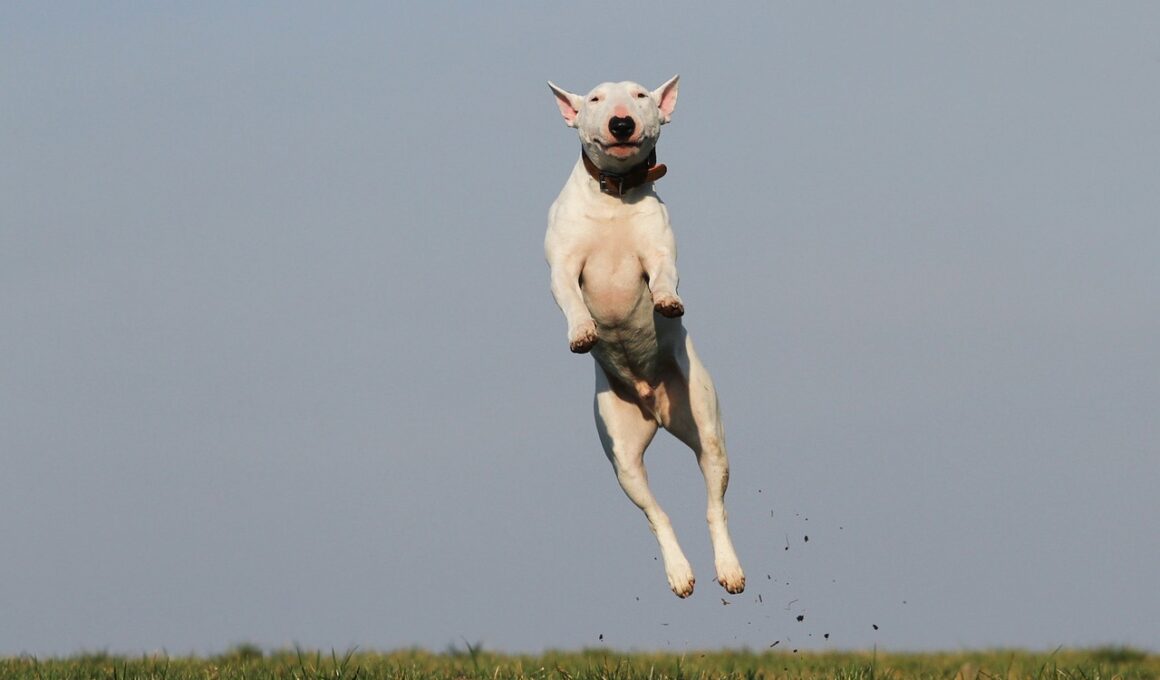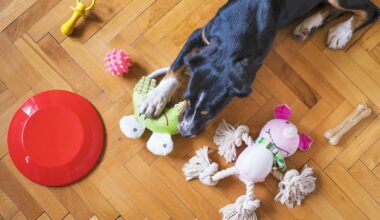House Training as a Tool to Build Confidence in Dogs
House training is a critical aspect of responsible pet ownership. It not only instills good habits but significantly contributes to a dog’s mental health. The process of house training helps a dog understand boundaries and expectations. A well-trained dog is less likely to engage in undesirable behaviors such as chewing furniture or soiling indoors. Importantly, house training develops a sense of security in your dog, as they learn what behaviors are acceptable. Consistency is key when establishing a routine for house training. Utilize positive reinforcement techniques to reward your dog for their successes. This could involve treats, praise, or playtime, all of which enhance the learning experience. In this process, it’s essential to remain patient and understanding, as each dog learns at their own pace. A dog that feels secure in their ability to communicate their needs often displays increased confidence and far less anxiety. Through house training, owners can forge a stronger bond with their canine friends. Remember that this type of training can also prevent stress-related issues, which can lead to more severe behavioral problems later.
Many dog owners underestimate the mental health benefits that house training offers to their pets. By focusing on these techniques, owners can significantly improve their dog’s overall behavior and emotional well-being. Establishing a routine fosters a secure environment, which is crucial for mental stability in dogs. When dogs understand what you expect from them, they feel more at ease and less insecure. The structure and predictability provided by house training allows dogs to manage their anxieties more effectively. Moreover, well-structured training sessions help relieve excess energy and redirect focus to positive actions. This can be compared to creating a stress-free zone where dogs thrive and grow. If a pet is struggling with confidence, consult a professional trainer who may provide additional strategies. They can support you in customizing house training to your dog’s unique needs. Engaging in consistent, friendly, and patient training sessions not only cultivates mutual respect but elevates your dog’s self-assurance. As your dog masters new skills, their motivation to learn expands, reinforcing a positive feedback loop and solidifying a happier mental state.
Understanding your Dog’s Behavior
Being attuned to your dog’s behavior is pivotal in effective house training. Dogs often communicate their emotional state through various behaviors. For instance, persistent whining or pacing could indicate anxiety or discomfort. Understanding these signs allows you to address your dog’s needs proactively. Observing your dog’s actions can also help determine when they need to go outside. By responding promptly, you reinforce their trust in you, which is crucial for maintaining mental well-being. Furthermore, recognizing patterns in your dog’s behavior can guide you in making training adjustments. If certain approaches seem ineffective, adapting your strategy can promote faster learning. Effective communication enhances your mutual relationship, building an atmosphere of cooperation. This partnership between you and your dog is instrumental in achieving successful house training. Additionally, don’t hesitate to explore alternatives like crate training if your current method isn’t working. A crate can become a safe space where your dog feels secure, helping to minimize anxiety. Remember, educating yourself on canine behavior will provide insights, making the house training experience smoother and more productive for both you and your pet.
Incorporating play into house training sessions can further enhance your dog’s confidence. When you use playtime as a reward, it reinforces learning in a fun and engaging way. This interaction strengthens the bond between you and your dog, making them more excited to participate in training. Moreover, enjoyable experiences during training can help reduce stress for anxious dogs, portraying learning as a positive venture. Activities like fetching their favorite toy or engaging in tug-of-war can effectively motivate your dog to cooperate during house training. The emotional benefits of a strong, playful relationship help alleviate anxiety or fear associated with training. Dogs thrive in environments where they feel love and acceptance; thus, interacting through play can drastically enhance their mindset. Ensure that training sessions are kept short but packed with excitement, limiting frustrations. As your dog becomes more familiar with house training expectations, incorporate variety into your routines to keep them stimulated. This can prevent boredom, which can add extra challenges in training. Remember, maintaining an uplifting atmosphere is as crucial as the training techniques themselves, leading to an overall improved experience.
Setting Realistic Goals
When house training your dog, it’s essential to set achievable goals. Realistic expectations ensure that both you and your dog can navigate the process without creating undue stress. Every dog learns at its own pace, influenced by factors such as age, breed, and temperament. Smaller, incremental goals are more manageable, allowing for steady progress over time. This approach will foster a more rewarding environment as your dog experiences success. Regularly celebrate successes, no matter how minor they may seem. This affirmation helps build confidence in your dog as they gradually master the expectations set before them. If challenges arise, don’t hesitate to reassess and modify your approach. In some instances, you might need to slow down or change your methods to better suit your dog’s needs. Engaging with professionals can also provide additional insights and encouragement. Remember, any setbacks should be viewed as learning opportunities rather than failures. By maintaining a positive focus on progression, you will strengthen your dog’s mental health and reinforce their self-esteem.
The importance of consistency cannot be overstated during house training. Establishing a regular schedule aids in forming good habits, enabling dogs to respond more predictably when they need to relieve themselves. This consistency cultivates security and trust between you and your furry companion. It’s crucial to take your dog outdoors frequently, especially after meals or playtime, to promptly address their needs. Rewarding them for appropriate behaviors builds lasting positive associations with house training. As a dog recognizes the pattern of going outside, it helps them to learn and feel confident about their actions. If interruptions occur, remain patient and gentle, as anxiety can hinder progress. Understand that occasional accidents will happen, and they should be treated as opportunities for learning. Creating a welcoming atmosphere encourages open communication between you and your dog. Many would benefit from setting specific spot training, where dogs can learn to associate certain areas as acceptable places for relief. This structured approach can enhance the success of training sessions, subsequently improving your dog’s mental health and reinforcing confidence.
Conclusion: The Impact on Mental Health
The benefits of house training extend far beyond just having a well-behaved pet. When implemented correctly, it actively contributes to improved mental health for dogs. This technique empowers dogs, allowing them to understand acceptable behaviors, fostering confidence and security. Training gives them the tools necessary to navigate their environments filled with potential anxieties or uncertainties. As a result, dogs develop stronger emotional resilience, equipping them to face various situations more calmly. House training ultimately helps prevent behavioral issues that may stem from stress or miscommunication, leading to happier, healthier lives. Investing your time and effort into effective house training pays off as your bond with your dog deepens and strengthens. This holistic approach to training can effectively enhance not only your dog’s mental health but also increase your overall enjoyment as a pet owner. In conclusion, the synergy between training, emotional well-being, and behavioral success emphasizes the importance of diligent house training. Nurturing your dog through this process yields a confident canine companion and a profound connection that transcends words.
In summary, house training can be a powerful tool in cultivating a confident, mentally healthy dog. Utilizing positive reinforcement, understanding canine behavior and setting realistic goals all work together to ensure a successful training process. The time invested in house training pays dividends, as you build a strong bond with your dog and foster security in their daily interactions. Ultimately, a well-trained dog takes greater joy in their life and in their relationship with you, the owner. This positive experience encourages both happy engagement and emotional growth, solidifying a lifelong bond. By ensuring that house training is maintained consistently and with the right techniques, you help your dog flourish emotionally. To enhance your experience, don’t forget to celebrate the milestones along the way, creating cherished memories that solidify your connection. Consider involving your family or close friends in training sessions, encouraging broader support in your dog’s socialization process. After all, a confident dog is a happy dog, and they deserve the best as part of your family. The journey of house training opens the door to countless joys and discoveries as you navigate your lives together.


